
16 minute read
Women in Horticulture: Profitable, sustainable businesses – Linda’s goals
Newly elected Chair of New Zealand Avocado Growers’ Association Inc, Linda Flegg, inspects avocados at KauriPak, the Katikati family business of which she is a Director
Profitable, sustainable businesses – Linda’s goals
AVOCADO FEATURE
Ensuring the industry association is relevant and sustainable into the future and grower views are well represented are among the goals for newly elected Chair of New Zealand Avocado Growers’ Association Inc, Linda Flegg.
By Elaine Fisher
An independent review of the structure of the avocado industry in 2020 highlighted a number of areas that growers felt could be improved, Linda says.
“We’ve never undertaken a formal review before, so it’s a real milestone for the industry. The information in the final report will give us recommendations to decide on a pathway to ensure we’re relevant for the next 10 years and beyond. That relevance is all about how we as an industry association support our members to have profitable and sustainable businesses.
“In combining the two organisations, NZ Avocado Growers’ Association Inc, and Avocado Industry Limited under the NZ Avocado banner, NZAGA lost its visibility as an organisation. The review reported that growers want to see that visibility restored, and I support that.” Other challenges ahead include competition from Chile, particularly in Australia; ensuring Asian markets receive the quality fruit they require; and handling the significant on-shore crop increases predicted to come on stream within the next 10 years. “Chile exported around 400,000 trays of avocados to Australia this season and that’s probably less than one percent of its total crop, so that’s a concern. While ensuring we retain our place in the Australian market, we also have to pay attention to Asian markets to ensure we retain and grow export volumes there.” In the current season, 1,016 New Zealand growers exported around 4.6 million trays of avocados, up from 2.9 million trays in the 2018–2019 season.
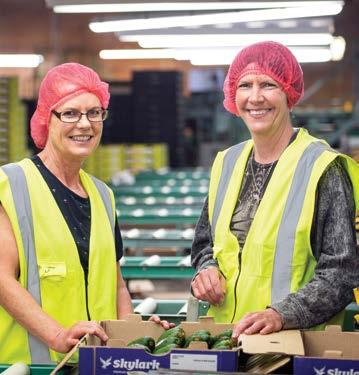
KauriPak avocado Business Manager Jenny Gilliver (left) with her sister Linda Flegg Linda Flegg carrying out pest monitoring on an avocado orchard
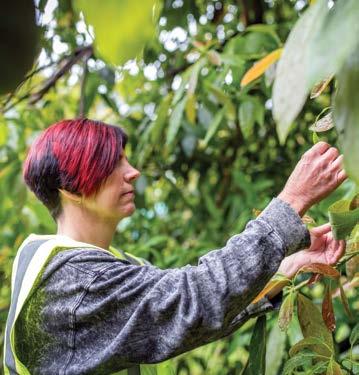
A plus (if there is one) of Covid-19, is that consumers are seeking healthy foods, increasing the demand for New Zealand avocados, but the negative impacts of the pandemic have included disruptions to shipping and increased costs of air freight. “Fortunately, this season’s fruit has been of very good quality and has stood up well to shipping delays.” While exporters and NZ Avocado are continuing to work closely with airlines and shipping companies, Linda believes disruptions are likely to plague the coming season too. “We are not a big enough industry to charter ships as Zespri does for kiwifruit.”
With all those challenges ahead, Linda’s role in the chair will not be easy, but she is focused on both the immediate issues and those of the future, with a vision “to quote former NZAGA chairman Ashby Whitehead – to make the boat go faster”. “Avocado growers are really passionate about long-term sustainability – not just for the environment, but social and economic sustainability too. “We want the industry to have a positive sustainability story by making evidence-based decisions for everything that we do. This will allow us to achieve our goals such as leaving a light footprint on the earth, supporting strong communities, and providing safe workplaces.” For Linda, her governance role requires stepping back a little and looking at the big picture, something she has learnt to do since being elected to the NZAGA in 2016. “I’ve always been a details, operations person but quickly realised that there is a difference between operations and governance. I joined the board to give back to the industry which has given much to me and to learn new skills.” In 2017 Linda was elected vice-chair. When in 2020 chairman Tony Ponder stepped down, she became the first woman in the NZAGA’s 40-year history to take the role. While believing roles in any organisation should go to the person best suited for that position, Linda is nonetheless pleased that the current NZAGA board has a strong female presence with Karen Pickford, Maria Watchorn and Paula Kearns also at the table. This reflects the fact that many women are involved in the management of avocado orchards and make up around 50% of the industry workforce. Linda, a member of Women in Horticulture, an organisation which supports women in the industry and encourages them to take leadership roles, grew up immersed in horticulture.
Her parents first bought a dairy farm at Kauri Point near Katikati in the 1950s, and over time converted the land to grow a wide variety of crops from pumpkins to kiwifruit and avocados.
As soon as she was old enough, Linda helped in the orchards and packhouse, but didn’t see a career future in the industry. “When I was at high school, the only career I knew of in horticulture was manual labour. How different it is now, with so many, many opportunities.” Educated at Katikati primary and high schools, Linda completed a certificate in business computing thinking about a career in IT. Her first job was in container logistics at the Port of Tauranga with Seatrans. “Part of my role was to train staff to make the transition from the DOS based computer software to Windows 1.” After five years and seeing little opportunity to progress in that role, Linda joined the private adult learning provider Bay Business Academy, training women to rejoin the workforce and helping teenage girls who struggled at school to gain the skills to prepare for work. In 1999, when her older sister Jenny Gilliver left to start a family, Linda stepped into her role in the family business. Today she is a director of the businesses Morris Moore Farms, KauriPak, AvoPic and Kingsmill Engineering, which between them employ 20 full-time staff. Morris Moore Farms operates the company’s avocado and kiwifruit orchards; KauriPak packs avocados for 160 grower clients; AvoPic is a contract avocado harvesting company servicing KauriPak clients, and Kingsmill Engineering maintains the machinery and equipment operated by the businesses. When Linda first joined the family firm, her role was only just full-time. Today she is responsible for the companies’ compliance requirements including health and safety, food safety, phytosanitary requirements and GLOBALG.A.P. while another full-time staff member carries out the administration work that once made up her role.
Miniature bull terrier puppy, River, with Linda Flegg, Chair of New Zealand Avocado Growers’ Association Inc, who is also a judge and breeder of bull terriers Linda’s first steps into industry leadership began when she joined the NZ Avocado Packer Forum which represents the companies packing avocados and has a memorandum of understanding with NZ Avocado, consulting on postharvest requirements. Four years ago, Linda was elected chair of the Katikati Fruitgrowers’ Association following a long family tradition of involvement in grower representation.
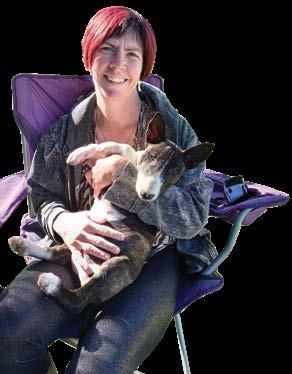
“When I stood for a position on the NZAGA board in 2016 I was up against two men and was pleased to win the seat.” Re-elected for a second term, Linda became deputy chair, and when Tony Ponder signalled his intention to stand down, expressed her willingness to upskill for that role. While very much her own woman, Linda nonetheless draws on the decades of experience her parents Dorothy and Hugh Moore have in the horticultural industry both as growers and in leadership roles. Hugh a former NZAGA chairman, is renowned for his exceptional memory of facts and figures, something Linda finds invaluable in helping understand the background to many of the avocado industry’s practices and quality standards. “Knowing the why behind the things we do helps with current decision making.” The “fashionable and trendy” status of avocado as a super food is among the attractions for many growers, and it is an industry which offers opportunities for all levels of orchard size and investment.
“It is still possible to be profitable on a small orchard as well as a large one, so long as growers apply best practice and produce quality fruit.” Bull terriers are Linda’s other passion. For more than 20 years she has bred and trained the breed under the name Vortex Kennels. Such is her expertise that Linda is a national and international judge, who has regularly travelled overseas to judge at prestigious events. “I have four adult bull terriers and two puppies at present. Numbers of pedigree bull terriers are dwindling, and my goal is to preserve the breed by working with owners and breeders to ensure that we continue to produce healthy bull terriers with sound temperaments.”
To keep up to date with our news and activities, join our membership database by emailing info@women-in-hort.nz. We welcome everyone.
Taking part in a horticulture field day?
Think about biosecurity! Here are some easy steps.
Field days are a great way to share information and knowledge in a hands-on way. However, movement of people, goods and vehicles between farms/orchards during a field day can present a biosecurity risk. Pests or pathogens can inadvertently be carried: − onto the host’s property − back to the attendees’ property.
Implementing simple everyday biosecurity practices can help to minimise the biosecurity risk for both hosts and attendees, which is a great outcome for all.
If you are an organiser:
− Include biosecurity messaging on promotional material and in communications with host properties. − Minimise the number of vehicles and use transport that is not usually used on the farm/orchard if possible. − Keep a register of all attendees to ensure tracing is possible if required. − Avoid visiting properties that are known to have high risk pest, pathogen or weed infestations.
If you are a host property:

− Make sure good biosecurity practices are visible on your property. − Provide a biosecurity briefing about the actions you’d like visitors to take so that attendees know what you expect of them. − Ensure that you have a designated and clearly signposted parking area. − Provide a footwear wash and disinfection station at the point of entry e.g. boot scrubbers and water for cleaning, sanitising spray or a footbath containing an appropriate sanitising product for disinfection. − Provide hand sanitiser if people will be touching plants or soil. − Avoid use of other people’s tools and equipment for demonstrations, unless they have been thoroughly cleaned and disinfected first. − Monitor the part of your property where the visit took place over time for unfamiliar pests, pathogens or weeds.

− Make sure your clothing and footwear is clean. Avoid wearing clothes and shoes that you wear on your own farm/orchard. − Clean and disinfect your footwear between each site during the field day and before returning to your own farm/orchard. − Follow all biosecurity signage and requests at host properties.

If you are an attendee:
Be a biosecurity champion:
HELP TO PROTECT YOUR PROPERTY AND YOUR SECTOR FROM PESTS AND PATHOGENS.
Disclaimer: While every effort has been made to ensure the information in this publication is accurate, Horticulture New Zealand does not accept any responsibility or liability for error of fact, omission, interpretation or opinion that may be present, nor for the consequences of any decisions based on this information.
YOUR INDUSTRY
ACROSS THE SECTOR — ACROSS THE COUNTRY
Going bananas
Page 58
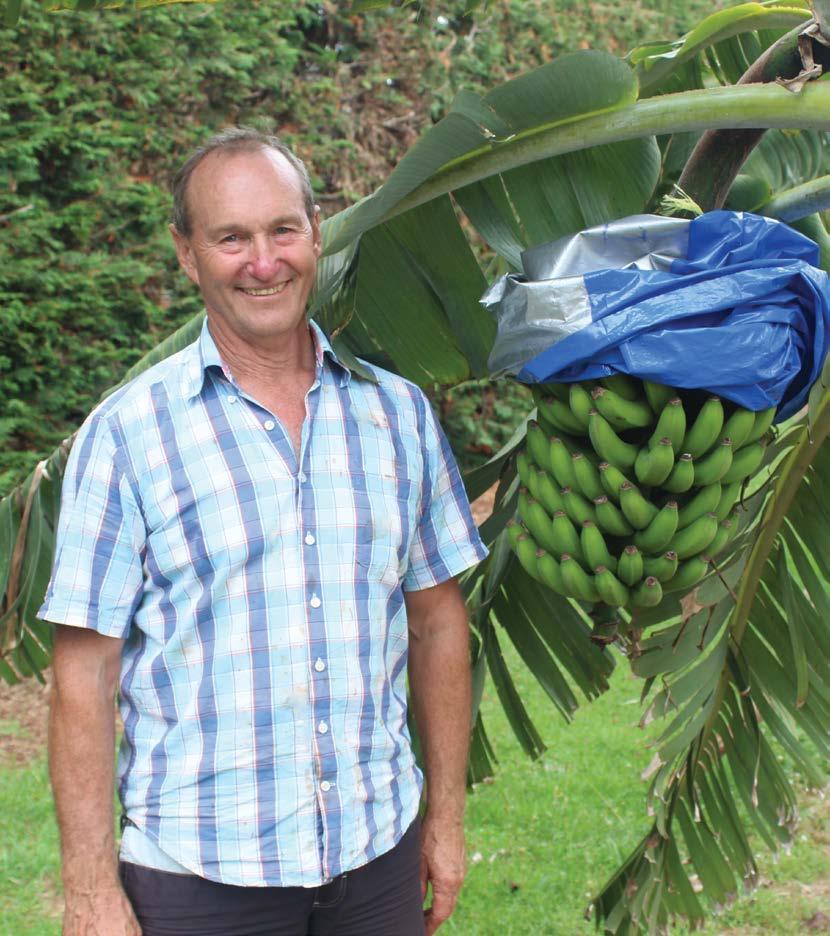

Hawke’s Bay Fruitgrowers’ Association President Richard Pentreath
Plan and hope: harvest 2021 underway
Hawke’s Bay horticulturalists have pulled out all the stops to plan for what will be the trickiest harvest in a decade with a tight labour supply due to Covid-19 restrictions and a strong New Zealand economy.
By Rose Mannering
Hawke’s Bay Fruitgrowers‘ Association president Richard Pentreath says there is no question growers harvesting apples and kiwifruit will face shortages. “There will not be enough, we won’t get anything like the number of New Zealanders we need. Unemployment levels are well below what was predicted. The uptake of subsidies for unemployed people to relocate has been very low. People with a history of unemployment have been offered a ‘Pastoral Support Plus’ subsidy of $1,000 if they move to a different region to help with the harvest, and stay for a period of six weeks or longer. Growers have been proactive, and those who may have been successful creating a point of difference might help. Competition for labour will hit its peak from mid-March through into April, as multiple apple varieties and kiwifruit all begin to come on stream. Increases in wages Recognised Seasonal Employer (RSE) scheme workers at $22.10, and the minimum rate increasing to $20.00 an hour on 1 April may lead to growers leaving some of their lower paying crops or varieties behind. Other innovative solutions include the setting up of programmes for senior school students picking over their Easter Term One break. “We are looking at ways to think outside the box, it will be a matter of somehow getting through,” Richard says. T&G had a promising start to their apple harvest in early February with one of their new varieties, Jugala, moving from tree to ship without any delays. Early shipments of Jugala were destined for Vietnam and China. T&G East Coast supply manager Ivan Angland acknowledged it will be a tricky season.
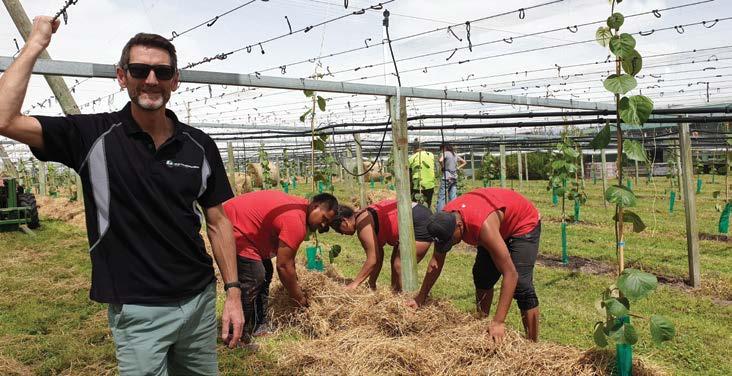
Richard Pentreath was thrilled to be able to find workers to undertake maintenance jobs – mulching young kiwifruit vines – prior to harvest. Spreading straw from left, Thomas Moeke, Ngati Martin, Rarangi Paku Matiaha
Like all industry participants, T&G know it will be tight with their labour supply. “We have done a lot of modelling; there will be tight periods. We will be staying calm and focusing on quality as we head into the Royal Gala harvest,” he says. Ivan is hopeful they will be able to harvest most of their crop. “We don’t foresee issues, but if we have to bypass crop, we will.” A modelling tool has been sent to all growers and suppliers to assist them with planning for their harvest. “We meet daily on this issue, we don’t want anyone to feel isolated,” he says. He expects suppliers will be taking unprecedented steps as each business does what it can to remove the crop. “The net will go wider if they have to; family members may be called in to help.” The final pick in some varieties may be sacrificed due to the labour shortage. “The last pick, or 10 to 15% of the crop, will be at risk of being left behind as growers move to the next variety,” he says. T&G feels comfortable with supply of its flagship variety Envy as it ripens later in the season, and because of its propensity to produce large fruit that is easy to pick. “Pickers want to pick it; we are in a lucky position with Envy as it is a premium product and will be treated accordingly.” RSE workers are coming out of MIQ (Managed Isolation and Quarantine) from early February. “We will be taking it slowly, so they get work fit; they are thankful we have invested in bringing them out here.” In late November the government announced 2,000 RSE workers from the Pacific Islands would be allowed to come into New Zealand. Extra government measures include raising the base payment to $22.10, paying Pacific Island workers a minimum of 30 hours a week while they are in MIQ, as well as flights and MIQ costs, a total of $7,000 per worker before a single apple is picked. AgFirst consultant Jonathan Brooks says the apple harvest is running five days earlier than a normal season. Most growers have navigated through the season with only small amounts of hail in Hawke’s Bay, and what initially looked like a stellar fruit season has pulled back to a good average, with a wet November contributing to a slow up in size. He believes the looming labour shortage will erode the professionalism of growing in New Zealand, with no guarantee of labour supply. “There will be serious challenges around labour; we are certainly not in the position of control we have been for the last few years – we are back to ‘winging it’,” he says. Growers have managed as much as they can, but with limited resources and opportunity. Ministry of Social Development (MSD) East Coast regional commissioner Annie Aranui says community engagement with MSD to try to plug labour gaps has been impressive. “We are all trying to make this season as positive as we can.”
The limitations on the numbers of backpackers and RSEs coming into New Zealand because of Covid-19 restrictions has meant employers need to do things differently to source their labour. There has been a greater focus on sharing between different product groups and regions to accommodate different peaks and troughs. “This will stand us in good stead going forward,” she adds. The greater reach by the horticultural industry to find pickers has made more people aware of career pathways within the industry. With some planning, she believes more continuous employment can be offered by horticulture.
The government has supported different study options allowing for greater personal development. “We accept it is a huge worry for employers, but also huge pluses. We are pleased with how everyone got through thinning,” she says. All of the government agencies have stepped up to do what they can – Hastings District Council, Ministry for Primary Industries, Ministry of Business, Innovation and Employment and Ministry of Social Development – everyone has stepped up. A trial to offer pastoral care for employers taking workers off the domestic purposes benefit has been rolled out to a wider group at the start of harvest. Richard Pentreath says that on his own kiwifruit block a heavy fruit set led to a big thinning job; he had 20 schoolage workers thinning through the summer. “They were slow, but did a reasonably good job,” he says. The kiwifruit crop is of good quality with high dry matter, with the size down a little on predictions. Last season’s kiwifruit returns were very good, and high prices are expected to carry through to the following season. “We are fortunate we are selling a product that is considered good for your health; millions of dollars of research money has been spent backing up these claims with science.”
“Now we have to wait and see if we can lure pickers away from apples for the second and third weeks of March,” he says.
SF_021_SFInBoxNZHalfPageAd_TheOrchardist2.qxp_SF_021_SFInBoxNZAdvertorial_TheOrchardist 2/17/21 2:12 PM Page 1
Pack Freshness with Confidence
New! AgroFresh is pleased to announce registration of SmartFresh™ InBox for apples and kiwifruit.
The original post-harvest choice to maintain consumer-desired produce freshness, flavour and quality is now available for convenient “on the move” fruit quality protection. SmartFresh InBox, now available for the first time in New Zealand, is an easy to use sachet that delivers AgroFresh’s proven SmartFresh technology to inhibit the negative effects of ethylene and maintain fruit quality throughout the distribution chain. Simply place the SmartFresh InBox sachet in the box and it is ready to be shipped immediately or stored depending on your needs.

• Protect shipments and target new business opportunities in long-distance markets • Ideal for pick, pack and ship • Reduce food loss
Actual size: 40.6mm x 45.7mm
FOR APPROPRIATE USE BY CROP, PLEASE CONTACT AGROFRESH NZ LTD: Jane Turner, Commercial Lead JaneTurner@agrofresh.com 021 777 024










